Last Updated on May 15, 2024
The rule ss or ß in German changed a lot during the 1996-2006 reform. ß used to be written much more often. And now in poorly checked digital dictionaries and other places you can sometimes find old spellings or both spellings. The Germans themselves often confuse which letter to write.
Use: difference between benutzen and verwenden, nutzen, gebrauchen, anwenden
Negation in German
Library in Germany. How to use
German. False participles
Basic German. 4. Time and prepositions of time in German
Basic German with tables. 2. Articles in German
Basic German grammar tables 1
ss or ß in German
In short, the rule will look like this.
a is any vowel,
c is any consonant.
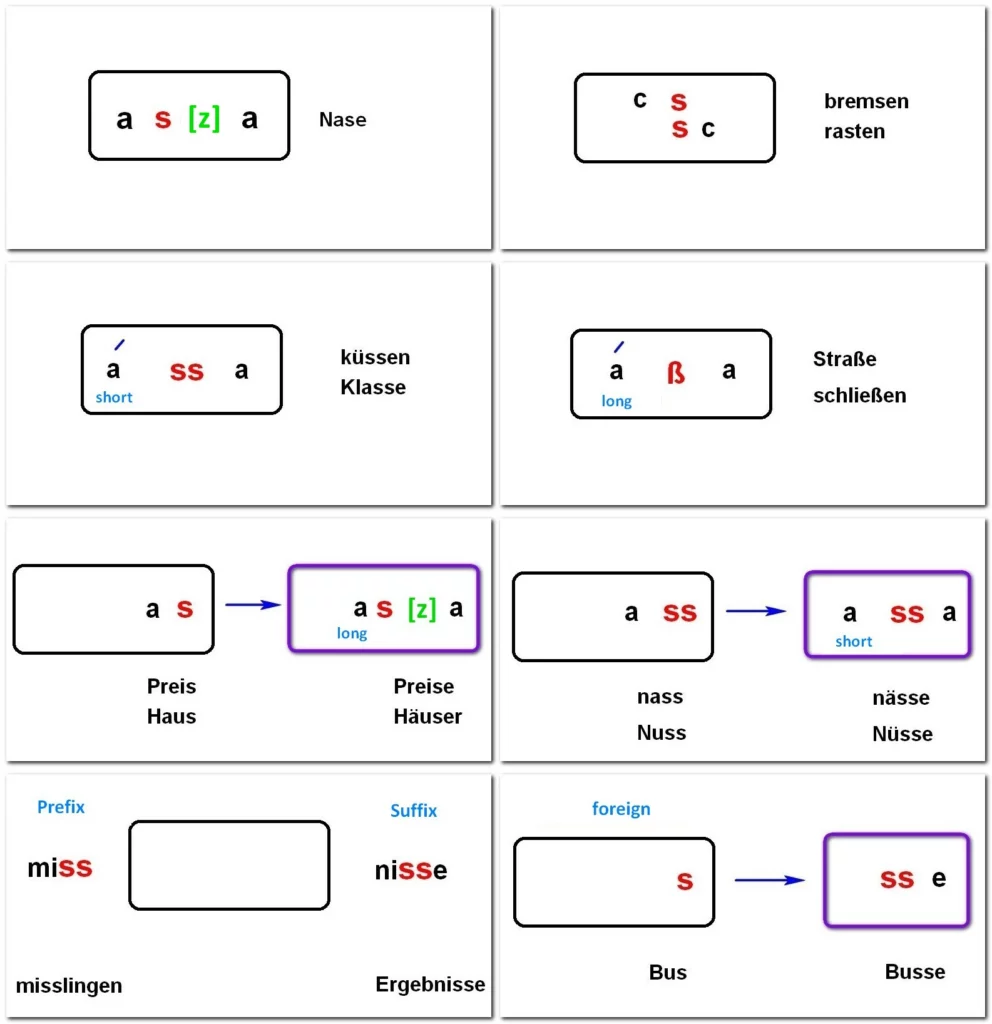
In the middle of the words
1. If s sounds as [z] between two vowels, then one s is written
Nase, Hase
2. If [s] sounds between two vowels, then ss or ß is written, depending on whether the vowel is long or short in the stressed syllable:
long – ß (Straße), short – ss (Tasse).
At the same time, the list of words with ß is finite and small. Almost all of them are given below, with the exception of rare words. You can memorize it if you don’t hear the length of the vowel.
It also helps to say the word by syllables. Tas-se sounds “correct”, Stras-se sounds strange, so there is no doubling.
If you live in Germany, then now you will happily object to me: I saw the word Strasse on the streets and in addresses! That is right. This is an exception for the normal reading of addresses, especially on street signs, so that it is normally perceived by traffic participants and there are no problems with parcels.
3. If after or before the sound [s] there is a consonant, then one s is written
Brust, Bremse
But if this happens during word formation, then the spelling that was in the original word is usually preserved
bisschen = Biss + chen
4. In foreign words, ss can also be in unstressed syllables (Fassade). We think like this: Fassade is a foreign word, ß is not written in them. If there was one s, then it would sound [fazade] instead [fasade], so we write ss.
5. The prefix miss– (misslingen) is written with ss.
At the end of the words
To check what to write at the end of a word, you need to lengthen the word:
– put in plural (and you can hear [z] or two ss)
– change form of adjective
Haus – Häuser
nass – nasse
6. If in the changed word [s] sounds, then ss or ß is written, depending on whether the vowel in the stressed syllable is long or short. Long – ß, short – ss:
Maß
nass
Double s is heard when the word is stretched
Nuss – Nüs-se
7. But: at the end of a word in foreign words there can be one s after short vowels. When these words are lengthened, ss appears:
Bus – Busse
Ananas – Ananasse
8. At the end of the word in native words there can be one s after long vowels. When lengthened, it turns into [z]
Maus – Mäuse,
Beweis – beweisen
Or these are monosyllabic words with a service function:
bis
9. In the suffix –nis, one s is written, but when the word is lengthened, it doubles.
For memorizing this rule well, you need to know the basic rule of double consonants. In fact, everything is subject to this basic rule.
If the stressed vowel is long, then one consonant is written;
if the stressed vowel is short, then two consonants are written.
In the second case, the consonants can be different, and then doubling does not occur, or the same, and then doubling occurs.
The difficulty arises from the sound [s] when reading: we have a long vowel, there should be one s, but it will be read as [z]. That is why they introduce “scharfes Es”, reflecting the sound [s] after a long vowel.
When my child writes one s instead of two, I always ask him to read it exactly as he wrote, and not as he wants: Nüse is still not [nysse], but [nyze].
So the shortened algorithm is
1. The list of words with ß is short, you can just learn it. A syllable with ß has a stressed long vowel.
2. One s is written:
if it sounds like [z] in its original form (Nase) or when changing the word (Maus – Mäuse)
or if there is a confluence of consonants (pusten)
or in the foreign word
3. If the word with a uncertain letter cannot be changed to sound [z] and the word does not belong to the list of words with ß, then two ss are written in it.
Usually this doubling is heard when the word is stretched. Naturally, after there should not be another consonant that cancels doubling.
List of the words with ß
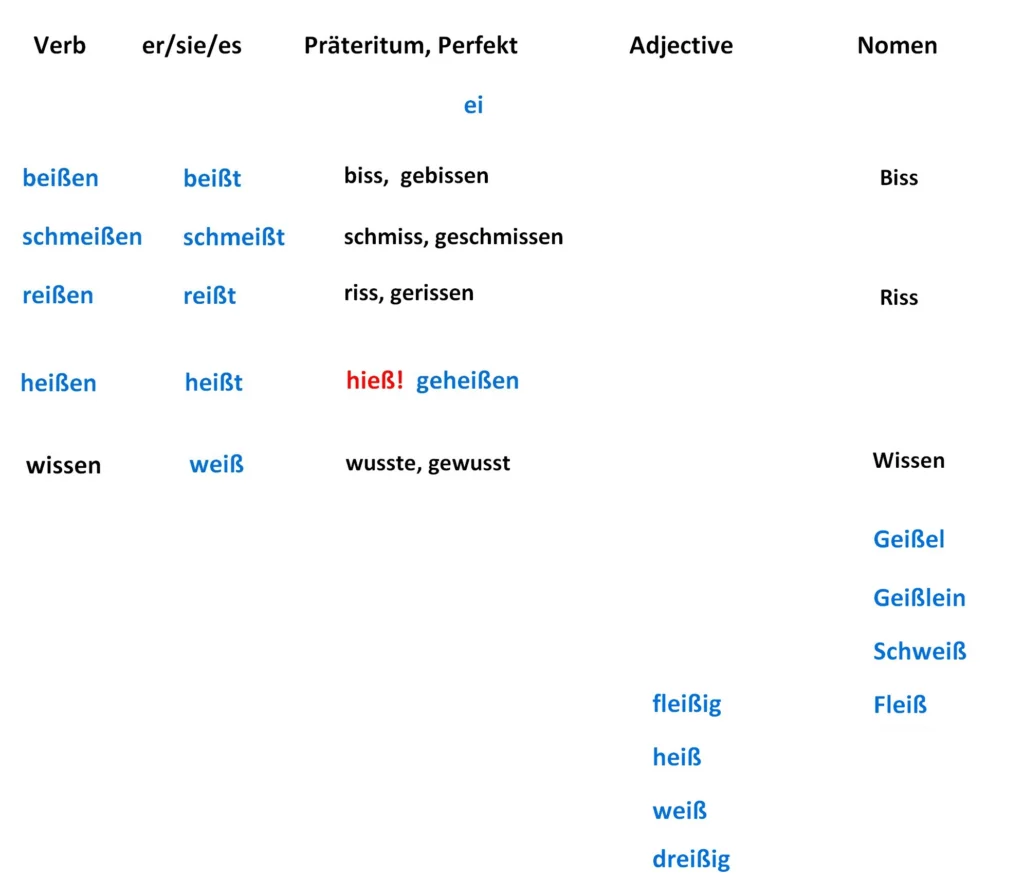
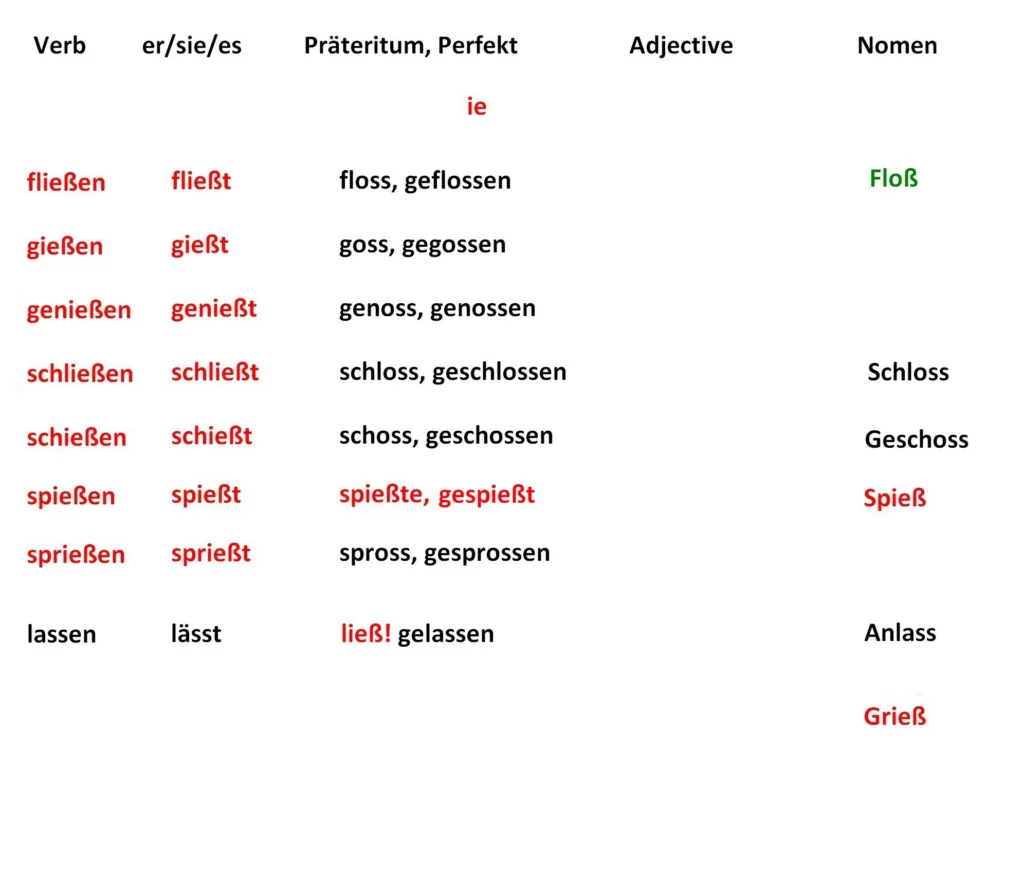
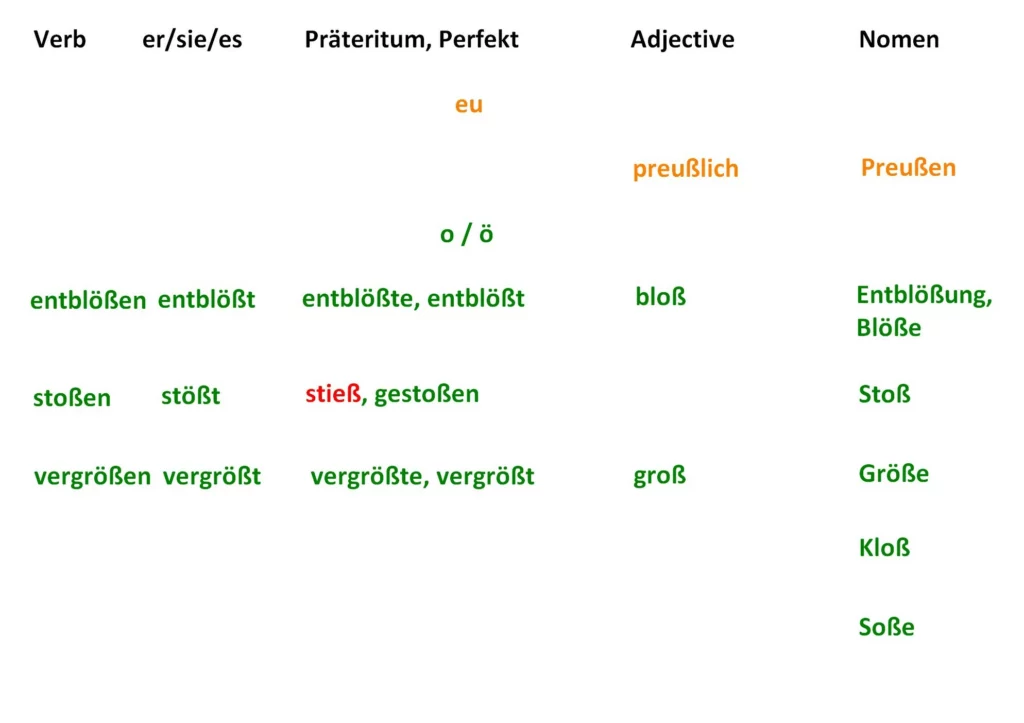
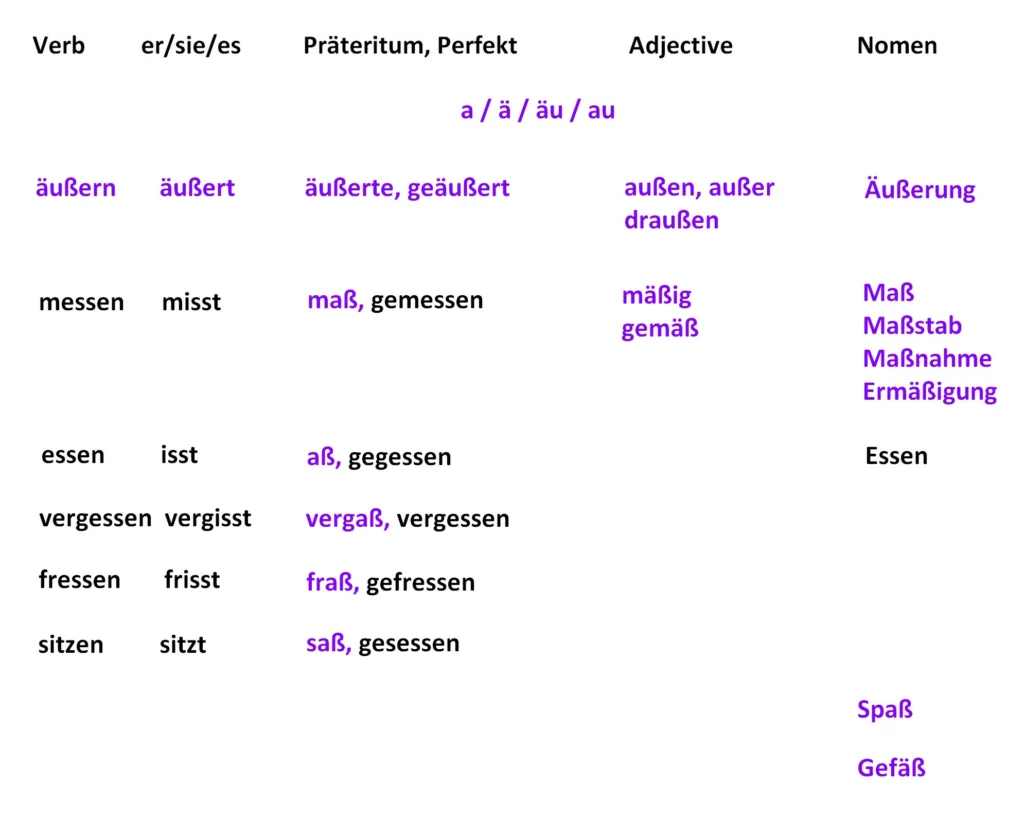

SS or ß lists
ß words
süß, groß, weiß, heiß, mäßig, außer, außen, draußen, dreißig, bloß, fleißig, gemäß
aß (from essen, Präteritum), fraß (fressen), maß (messen), ließ (lassen), saß (sitzen), vergaß (vergessen), weiß/weißt (from wissen, only two forms),
beißen (but biss, gebissen), gießen (but goss, gegossen), schließen (but schloss, geschlossen), genießen (genoss, genossen), stoßen, schießen (schoss, geschossen), fließen (floss, geflossen), schmeißen (schmiss, geschmissen), reißen (riss, gerissen),
heißen, büßen, äußern, flößen, entblößen, einflößen, geißeln, grüßen, kreißen, schweißen, spießen
die Straße, die Buße, die Blöße, die Soße, die Scheiße, die Äußerung
das Gefaß, das Floß, das Gemäß, das Gesäß, das Maß, (das) Preußen
der Fuß, der Spaß, der Gruß, der Spieß, der Grieß, der Fußball, der Reißverschluss, der Fleiß, der Kloß, der Kreißsaal, der Maßstab, der Schoß, der Schweiß, der Ruß, der Strauß
ss-words
bass, nass, passiv (unstressed), blass, hässlich, grässlich, bisschen, bewusst, krass, bissig, interessant, besser, gewiss, besessen
essen, küssen, wissen, fressen, vergessen, passen, messen, lassen, hassen, verbessern, müssen, fassen, befassen, pressen, beeinflussen, vermissen, Gassi gehen, passieren (unstressed)
past tense forms: goss / gegossen, biss / gebissen, schloss / geschlossen, genoss / genossen, schoss / geschossen, floss / geflossen, schmiss / geschmissen, riss / gerissen
die Klasse, die Kasse, die Gasse, die Messe, die Tasse, die Nuss, die Schüssel, die Adresse, die Narzisse, die Prinzessin, die Fassade (unstressed), die Kassette (unstressed), die Delikatesse, die Kompresse, die Interesse, die Flüssigkeit, die Massage (unstressed), die Rassel, die Fitness (unstressed)
der Kuss, der Pass, der Essig, der Fluss, der Imbiss, der Kessel, der Schlussel, der Sessel, der Stress, der Schluss, der Schuss, der Anlass, der Zuckerguss, der Professor (unstressed), der Kompass (unstressed), der Genuss, der Boss, der Kongress, der Kasseler, der Missbrauch, der Rüssel, der Russe, der Express
das Ross, das Wasser, das Schloss, das Messer, das Kissen, (das) Russland, das Karussell (unstressed), das Gebiss, das Erdgeschoss, das Passwort, das Dessert (unstressed)
s-words
are extended in [z] or auxiliary words:
das Glas, das Gleis, das Moos, das Haus, das Eis, das Gras, das Gas
der Kies, der Beweis, der Reis, der Preis, der Kreis
die Maus
tschüs, bis, das, des, aus
foreign:
die Ananas, die Iris
der Bus, der Blues, der Globus, der Atlas, der Türkis, der Kosmos, der Fokus, der Krokus, der Bus
das Tennis, das Chaos
[z] (selectively)
böse, gesund, lesen, leise, reisen, riesig, losen
Gemüse, Gesicht, Wiese, Hase, Dose, Ameise, Nase, Rasen, Vase, Besen, Gesetz, Person, Lösung, Musik…
[s] (selectively)
Ast, Test, Nest, Ost, Rätsel, August, Fenster, Hals, Herbst, Ostern, Schwester, Rast, Wachs, Fels, Bremse, Kasten, Gast, Trost, Last, Brust, Wüste…
More topics about #German grammar
#German vocabulary (synonyms, idioms)
#tests and exams
Do you enjoy the site without cookies and maybe without ads? This means that I work for you at my own expense.
Perhaps you would like to support my work here.
Or Cookie settings change: round sign bottom left

While it was happening, many people in Germany referred to the ‘Rechtschreibreform’ as the ‘Schlechtschreibreform’. In a couple cases, entire Bundesländer took the Kultusminister to court over the proposed changes. There was a period of about 7 or 8 years where both sets of spelling rules were considered simultaneously correct, until the deadline had passed, causing much confusion among students. One of the chief arguments in favor of the changes was that a spelling reform would make German easier for foreigners to learn, though spelling had been one of the least challenging aspects of the language. Simplifying the grammar would have made more sense, if ease of learning had been the goal.
Words like “Schiffahrt” were changed to “Schifffahrt” after the reform. “Flußschiff” became “Flussschiff”, and so on. Street signs were even changed to reflect the new spellings! Phrases that had been separate by the old way of spelling (zur Zeit) became joined in the new (zurzeit), while words like “zuhause” were separated into “zu Hause”.
After all these years, spellings like “dass”, “muss” and “wusste” still look odd… !
You obviously have been in Germany for a long time. For me, muss and dass are ok. In my opinion, the rule now makes sense. Less need to learn by heart. Books with old spellings are difficult to read. But those who are used to the old spelling, of course, do not perceive the new well. Changes in language and spelling are always met with hostility in all countries, so they are rarely carried out and not always completely successful, because they try to please everyone. In my opinion, there are much less successful innovations, such as the new written multiplication in Germany.